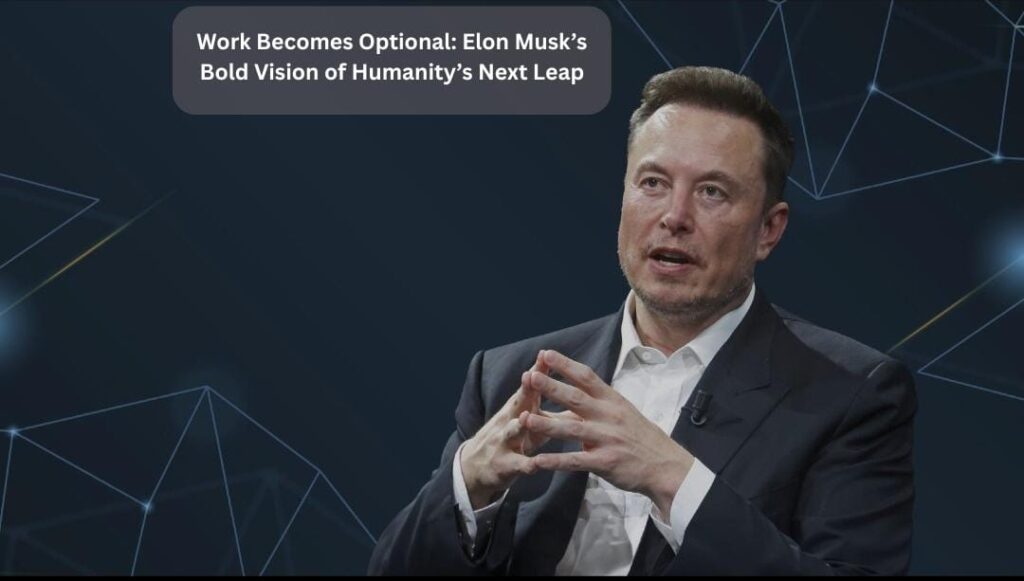Elon Musk Says Jobs Could Become Optional as AI Ushers in a New “Age of Abundance”

A future where you work only if you want to. It sounds like a fantasy straight out of sci-fi, yet Elon Musk believes this is exactly where the world is headed.
In October 2025, responding to news about Amazon potentially replacing hundreds of thousands of jobs with AI and robots, the Tesla and SpaceX chief shared a visionary prediction on X (formerly Twitter). Instead of sounding the alarm about automation, Musk called it a huge opportunity for humanity. According to him, we are moving toward a historic shift in how society functions, what we value, and why we get out of bed each morning.
Musk calls this coming era the “Age of Abundance.”
What Is the “Age of Abundance”?
Picture a society where machines take care of every basic human need. Robots build products, AI runs services, and automation becomes so efficient that the cost of producing most things drops close to zero.
In such a world, scarcity stops being the driving force of economies. Access to essentials like food, shelter, energy, healthcare and even luxury experiences would no longer depend on income or privilege. Technology would make them universally available.
That, Musk says, is the Age of Abundance.
It is a future where productivity no longer depends on human labor and the meaning of success shifts from survival to growth, curiosity and human connection.
From “Universal Basic Income” to “Universal High Income”
The idea of Universal Basic Income (UBI) has been discussed for years. It proposes that governments provide every citizen with a minimum guaranteed amount of money, helping them meet basic needs even without a job.
Musk believes the world can go a lot further. He imagines Universal High Income (UHI).
Not just surviving. Thriving.
If AI and robotics generate immense economic value, he argues, wealth could be distributed across society so broadly that working becomes optional. Every person could enjoy a comfortable life without the stress of earning a paycheck.
This challenges the entire structure of today’s economy, where work is linked to dignity and livelihood. Musk suggests a new definition of prosperity that isn’t tied to employment.
The Next Big Question: What Gives Life Meaning?
There is a catch. If money and survival are no longer tied to work, what keeps people motivated? Work has traditionally given humans routine, purpose and identity. It connects us to community and gives us pride.
Musk admits that the hardest part of this future is psychological, not technological. When work becomes a choice, people will need to rediscover meaning in:
• Creative expression
• Innovation and scientific exploration
• Helping others
• Family, friendships and community activities
• Personal passions that today might not pay the bills
Humans may have to redefine success not by what they do, but by who they become.
The Future Includes Personal Robots at Home
Musk is not just predicting this future. He is trying to build it.
Tesla’s humanoid robot, Optimus, is already learning to perform daily household tasks. Cooking, cleaning, carrying groceries, elderly care support and more. Musk thinks that within a decade, having a personal robot could become as normal as owning a smartphone.
These machines could be companions, helpers and assistants for everyone, not just the wealthy. Another major step toward that abundant future.
Experts Are Split: Evolution or Disruption?
Not everyone agrees that jobs will vanish entirely. Many economists believe:
• AI will replace repetitive and low-skill work
• New roles will emerge in oversight, design, strategy and AI management
• Human creativity, empathy and judgment cannot be fully automated
Where everyone agrees is that the transition might be tough. Workers displaced by automation could face unemployment and hardship before governments and industries adapt. Social and economic inequality may rise before it improves.
The promise is massive. The risks are too.
What Should Today’s Workers Do?
One thing is certain. AI is not waiting. It is already changing businesses and careers.
People who adapt will benefit. People who cling to old systems may struggle.
Here is how anyone can prepare:
1. Keep upgrading your skills
Focus on human strengths AI cannot copy easily: creativity, emotional intelligence, strategy, problem-solving.
2. Work with AI, not against it
Let automation handle routine tasks while you move toward leadership, innovation and decision-making roles.
3. Stay curious for life
Learning cannot stop after school. The more flexible you are, the more opportunities you will find.
Are We Ready for a Job-Optional Future?
The idea of working for pleasure instead of necessity is thrilling. It also forces us to rethink what really matters. Musk has a track record of turning wild dreams into real inventions, from electric cars and reusable rockets to brain-computer interfaces.
Whether the Age of Abundance arrives fully or in phases, one truth stands firm:
Work will change. The challenge is how we adapt to change.
Elon Musk is pushing us to imagine a world where humans finally have the freedom to choose. To create. To explore. To live life on our own terms, not for a paycheck.
The future might look nothing like the past. That might be exactly what makes it exciting.